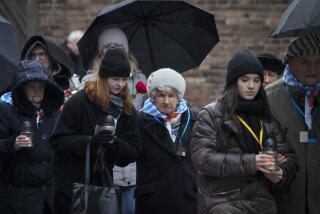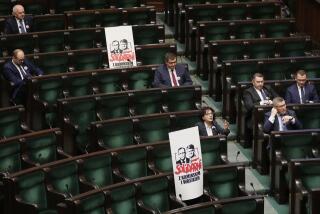Bonn Parliament Leader’s Ouster Asked : Hitler Era Hailed as ‘Glorious’
- Share via
BONN — The president of Parliament called the early years of the Hitler era a “glorious” time for many Germans, triggering a walkout during the government’s solemn ceremony today marking the Kristallnacht.
The remarks by Philipp Jenninger led to demands for his resignation by members of the opposition Greens and Social Democrats, who were among about 50 who marched out of the hall during the nationally televised speech to Parliament.
Jenninger’s address threatened to overshadow West Germany’s carefully planned ceremonies marking the 50th anniversary of the Kristallnacht, the night the Nazis began their first organized push against the Jews.
Social Democrat Chairman Hans-Jochen Vogel later wrote to Jenninger, saying the Parliament president had shown a “disturbing lack of judgment” in his speech. Vogel said he and other Social Democrats were filled with “shame and sorrow” over what Jenninger had done.
The 56-year-old conservative talked at length about the positive feelings of many ordinary Germans early on in the Hitler dictatorship, but without giving counterbalancing comments.
“Didn’t Hitler bring to reality what (Kaiser) Wilhelm II had only promised, that is to lead the Germans to glorious times? Wasn’t he chosen by providence, a Fuehrer such as is given to a people only once in a thousand years?” Jenninger asked rhetorically.
“For the fate of the Germans and European Jews, Hitler’s successes were perhaps even more fateful than his crimes and misdeeds,” Jenninger said.
“The years from 1933 to 1938, even from a distant retrospective and in the knowledge of what followed, still are a fascinating thing today, since throughout history there was hardly a parallel to Hitler’s triumphal procession during the first years.”
Jenninger then cited such events as inclusion of the Saarland, Austria, and part of Czechoslovakia into the Third Reich, as well as the 1936 Summer Olympics in Berlin.
Starting with the Kristallnacht of Nov. 9-10, 1938, the Nazis made clear their intentions to wipe out European Jews. On that night, Nazi thugs destroyed Jewish homes, businesses and synagogues, sending 30,000 Jews to concentration camps and killing 91 Jews.
Shattered glass covered the streets and the Nazis, in a boastful mood, named it Kristallnacht, which in English is Crystal Night.
The Nazis killed 6 million Jews and many others deemed “undesirable” during Hitler’s rule from 1933 to 1945.
Before Jenninger spoke, an 88-year-old Nazi concentration camp survivor read one of the most dramatic poems about the Holocaust, quoting the words “death is a master from Germany.”
Ida Ehre, daughter of a Jewish cantor, read from Paul Celan’s poem “Todesfuge.”
“Death is a master from Germany, his eye is blue,” Ehre, an actress and director in Hamburg, read. “He strikes thee with leaden bullets, he strikes thee exactly.”
More to Read
Sign up for Essential California
The most important California stories and recommendations in your inbox every morning.
You may occasionally receive promotional content from the Los Angeles Times.










